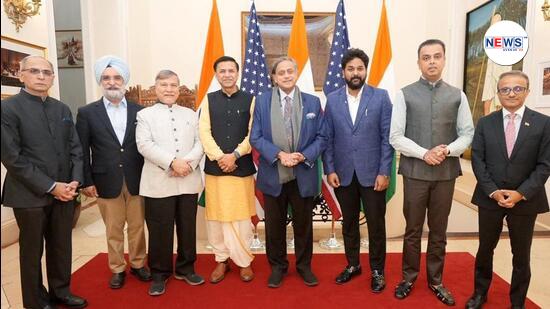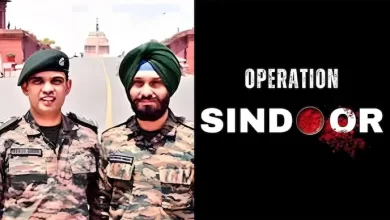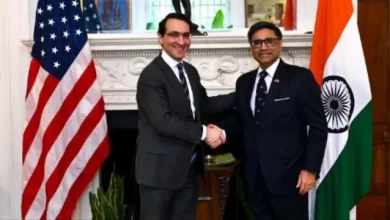
Pakistan will pay increasingly higher price for backing terror: Shashi Tharoor
India has demonstrated that Pakistan will have to pay an increasingly higher price for backing terror attacks against the country because Islamabad has failed to display any seriousness about tackling terrorism, Congress leader Shashi Tharoor, the leader of an all-party delegation visiting the US, said on Sunday.
Pakistan is a “revisionist power” that is willing to use terror to gain control of Indian territory and the Pahalgam attack of April 22 was aimed at undermining normalisation in Jammu and Kashmir and provoking a backlash in the rest of India since the terrorists targeted only Hindus, Tharoor said during an interaction with think tanks and the media at the Indian consulate in New York.
The delegation led by Tharoor is one of seven teams of parliamentarians, political leaders and former diplomats that the Indian government has sent to different parts of the world to inform key partners of New Delhi’s new approach to combating cross-border terrorism and to explain the rationale behind Opeartion Sindoor, launched on May 7 to target terrorist infrastructure in Pakistan.
“No one sitting in Pakistan is going to be allowed to believe that they can just walk across the border and kill our citizens with impunity. There will be a price to pay and that price has been going up systematically,” Tharoor said. He noted that India responded to the Uri attack of 2016 with surgical strikes across the Line of Control (LoC) and the Pulwama suicide bombing of 2019 with an air strike on a terrorist camp across the international border.
“Now, we have not just crossed the LoC, we have also crossed the international border. We have hit Pakistan in their heartland and we’ve done so only to send a message about terror. We remain absolutely clear that we are not interested in warfare with Pakistan,” he said.
“We have no desire to have anything that the Pakistanis have. Sadly, we may be a status quo power, they are not. They are a revisionist power, they covet territory that India controls and they want to have it at any price. And if they can’t get it through conventional means, they’re willing to get it through terrorism. That is not acceptable to us.”
The Pahalgam attack on April 22, which killed 26 people, was aimed at disrupting the process of normalisation in Jammu and Kashmir as more tourists were visiting the region and to provoke a backlash in the rest of India as the “victims were overwhelmingly Hindu” and were identified by the attackers on the basis of their religion, he said.
The terrorists didn’t achieve their objective as there was no backlash and “Indians held together unitedly in the face of this atrocity”. Tharoor also highlighted the involvement of The Resistance Front, a proxy for the Lashkar-e-Taiba (LeT) in the attack and the role of China and Pakistan in removing a reference to the group in a statement issued by the UN Security Council.
India “hit hard” and “hit smart” in its response to the Pahalgam attack by targeting terrorist infrastructure at nine locations in territories controlled by Pakistan on May 7. These precisely calibrated strikes sent a clear message that India is “not going to take terror lying down” and that this was not the “opening salvo in a protracted war, but just an act of retribution”, he said.
Pakistan’s response triggered four days of clashes that ended when India’s military targeted key Pakistani airbases on May 10, Tharoor said. “We didn’t want to start anything. We were just sending a message to terrorists. You started, we replied. You stop. We’ll stop,” he said.
Tharoor also highlighted India’s attempts in the past to work with Pakistan to tackle terrorism, such as in the aftermath of the 2008 Mumbai terror attacks and the 2016 Pathankot attack. “Now, there’s got to be a new bottom line to this. We have tried everything, international dossiers, complaints to the sanctions committee, diplomacy…Pakistan has remained in denial. There has been absolutely no conviction, no serious criminal prosecution, no attempt to dismantle the terror infrastructure in that country and the persistence of safe havens,” he said.
The delegation led by Tharoor, which is also visiting Panama, Guyana, Brazil and Colombia, will return to the US next month to meet members of Congress and political leaders. The delegation also visited the National 9/11 Memorial and paid tribute to the victims of the terror attacks of September 11, 2001 and reiterated India’s solidarity in the global fight against terrorism.
BJP MP Baijayant Panda, who is leading another all-party delegation, said during an interaction in Bahrain that Operation Sindoor had demonstrated India’s ability to call out Pakistan’s “nuclear blackmail”. He said more than 50 sanctioned terrorists and terror organisations that openly operate in Pakistan.
“The sad thing is Pakistan has been using its nuclear capacity to promote terrorism…Our new doctrine is we have called their [Pakistan’s] nuclear bluff, we will no longer be blackmailed by their nuclear bluff,” Panda said. “We can and will retaliate, things will never go anywhere close to being nuclear because our intention is not hostility, our intention is to extract a cost, to deter them.”
Panda and the delegation met Bahrain’s deputy prime minister Shaikh Khalid bin Abdulla Al Khalifa, Ali bin Saleh Al Saleh, the chairman of the Shura, and Abdulnabi Salman Ahmed, the first deputy speaker of the Council of Representatives, and highlighted India’s strong stand against terrorism.
Another all-party delegation led by NCP-SP MP Supriya Sule met Hamda Al Sulaiti, deputy speaker of Qatar’s Shura Council and Qatari MPs and conveyed India’s “national outrage” over the Pahalgam terror attack and highlighted the visit reflects the “united stance on cross-border terrorism”. The Qatari side emphasised its “zero-tolerance policy” against terrorism.
Yet another all-party delegation led by JD-U MP Sanjay Kumar Jha interacted with the members of the Indian diaspora in South Korea on Operation Sindoor and spoke about Pakistan’s “involvement in orchestrating the brutal terror attack in Pahalgam”, the Indian embassy in Seoul said. “Our initial response as well as subsequent action was measured, targeted, non-escalatory and responsible. Reaffirming the nation’s principled and resolute stand against terrorism, they reiterated that dialogue cannot co-exist with terror,” the embassy said.





